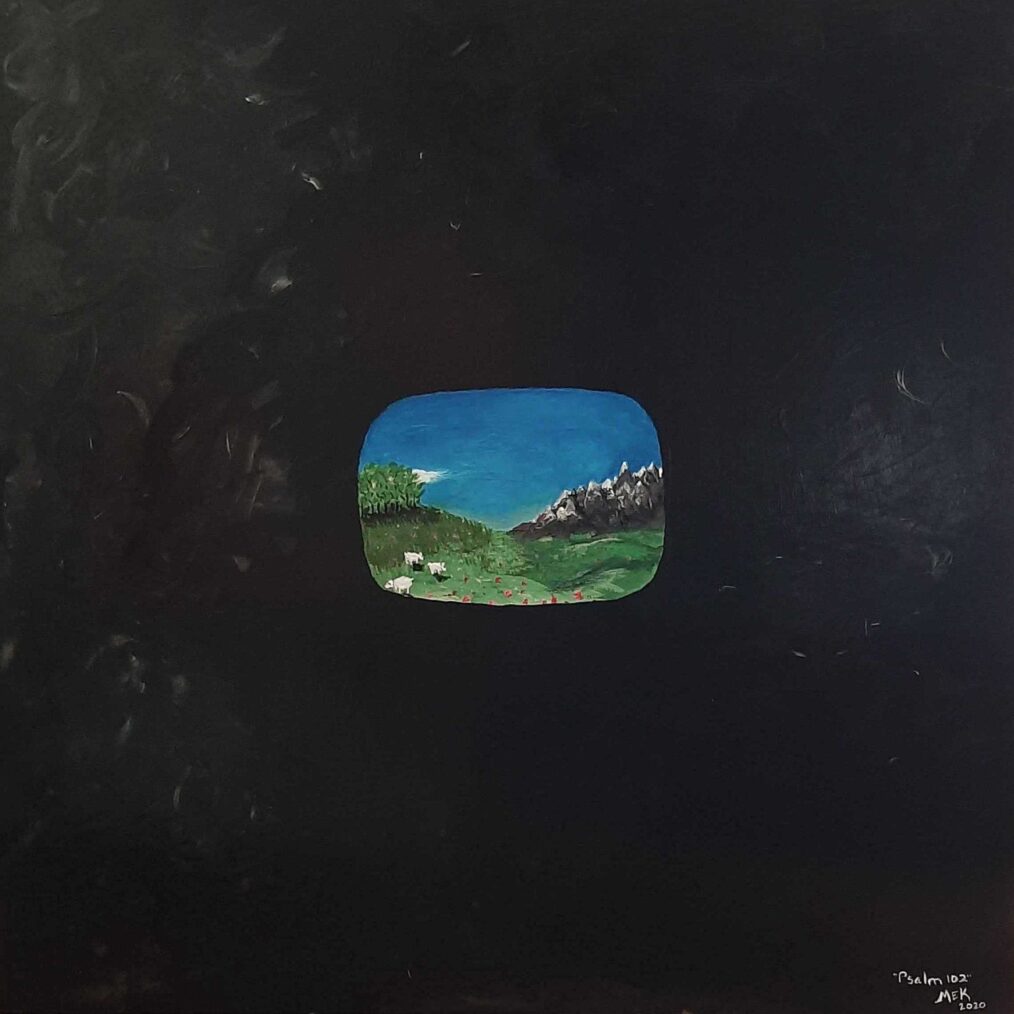
Psalm 102—Artwork
Learn more about Christ in the Psalms weekly artwork and see previous pieces here.
Person: Margie Keith
I’ve been in Denver since the summer of 2018. I was born and raised in Southern Vermont, but I have a wanderer’s heart, and have lived all over the continental US and traveled extensively overseas. I have the honor and privilege of being the office manager here at Park Church.
Piece: Acrylic
The center of the piece was done with brushes not much thicker than a toothpick, and the outer blackness was done with my fingers. It took around 6 hours to complete the painting itself, not including prepping the wood and sealing the completed piece.
The caption of the Psalm, in the ESV translation, is “A prayer of one afflicted, when he is faint and pours out his complaints before the Lord.” As I was studying this Psalm, I was struck by the sense of darkness and sorrow surrounding the author. The words smoke, ashes, shadow, waste places, wilderness, and withered are used to describe his state. It conveys a deep sense of sorrow, heaviness of heart, emotional desolation. I love the Psalms because they do not shy away from grief and trial, nor do they encourage us to search for the silver lining, and though there are 150 of them, you will not find the words “well, at least…” anywhere at all. The Psalms are where you can sit with sorrow as with a friend, a familiar (if unwanted) companion whom you know quite well. It’s apt for me that this Psalm is being taught on Father’s Day. My dad died suddenly when I was 10, and Father’s Day has always been for me a day of lament, a day of missing him desperately, wondering what my life would have looked like with him in it. Whether you’ve experienced major grief such as the loss of a loved one, or many micro-griefs, such as losing a job, losing friendships, having to walk away from a dream you’ve always had or a wrestling with a dream that’s unfulfilled, fighting illness or infertility, lingering wounds that have been inflicted on you by others… whatever your shadow is, this Psalm reminds us that we’re not alone there. God is not afraid of our pain, and is not uncomfortable with dark places.In Matthew Henry’s commentary on Psalm 102, he says this:
When our state is afflicted, and our spirits are overwhelmed, it is our duty and interest to pray, and by prayer to pour out our complaints before the Lord, which intimates the leave God gives us to be free with him and the liberty of speech we have before him, as well as liberty of access to him; it intimates also what an ease it is to an afflicted spirit to unburden itself by a humble representation of its grievances and griefs.
The beauty of our faith is that God is still good, and still loving, and still willing and able to rescue and succor us, no matter what darkness we are surrounded by. He wants us to cry out to Him. Darkness is not an absence of God’s presence with us, but rather an invitation for us to draw closer to Him. “He regards the prayer of the destitute, and does not despise their prayer” (v. 17). He has not left you alone! He is at work even now, sharpening and refining and mending you.“Let this be recorded for a generation to come, so that a people yet to be created {that’s us} may praise the Lord: that He looked down from His holy height; from heaven the Lord looked at the earth, to hear the groans of the prisoners, to set free those who were doomed to die” (v. 18–20).
This Psalm embraces pain. It does not minimize or negate our suffering. Our American culture tends to shy away from pain and discomfort, and will often take extreme measures to avoid it. We as Christ followers need to learn to lean into that pain, to learn from it, to greet it like a companion we aren’t frightened by because we know it so well. We have no need to be afraid of sorrow because—and this is the important part—it begins in darkness but it does not remain there forever. We have hope, we have a source of light and goodness that cannot be dimmed. “In Him was life, and that life was the light of all mankind. The light shines in the darkness, and the darkness has not overcome it” (John 1:4–5, emphasis mine). In this painting, you see an idyllic meadow with sheep grazing, flowers blooming, and mountains shining in the distance. It is a place of peace and safety, and even though it’s surrounded by swirling dark clouds, the darkness cannot cover it. We are His sheep, and though we will fade like wildflowers, He is mindful of us. His faithfulness endures like the mighty mountains, and His love reaches to the heavens. We can mourn freely, knowing He is our help, and that He will never let the darkness take us. He is our safety and shelter, our peace in the midst of the storm.